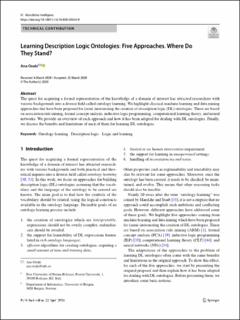Learning Description Logic Ontologies: Five Approaches. Where Do They Stand?
Journal article, Peer reviewed
Published version

Åpne
Permanent lenke
https://hdl.handle.net/11250/2728331Utgivelsesdato
2020Metadata
Vis full innførselSamlinger
- Department of Informatics [916]
- Registrations from Cristin [9482]
Originalversjon
KI - Künstliche Intelligenz. 2020, 34, 317–327. https://doi.org/10.1007/s13218-020-00656-9Sammendrag
The quest for acquiring a formal representation of the knowledge of a domain of interest has attracted researchers with various backgrounds into a diverse field called ontology learning. We highlight classical machine learning and data mining approaches that have been proposed for (semi-)automating the creation of description logic (DL) ontologies. These are based on association rule mining, formal concept analysis, inductive logic programming, computational learning theory, and neural networks. We provide an overview of each approach and how it has been adapted for dealing with DL ontologies. Finally, we discuss the benefits and limitations of each of them for learning DL ontologies.
